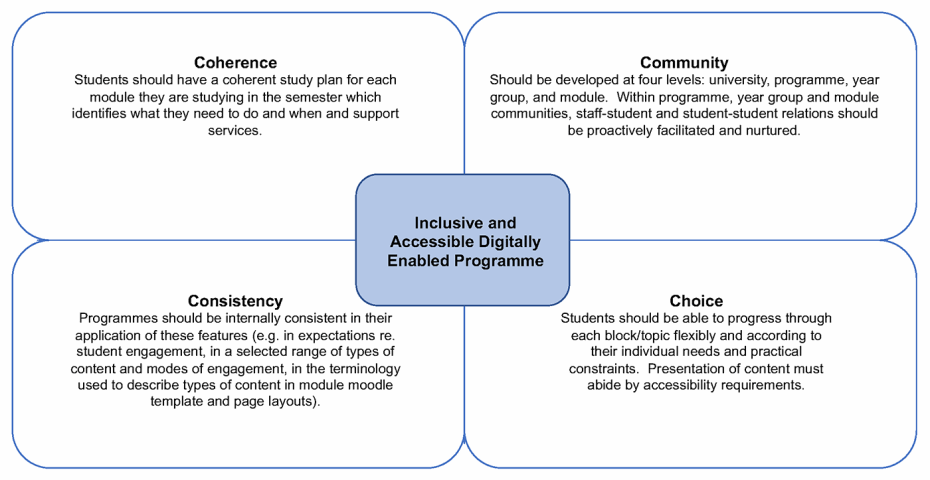The Oxford Brookes Framework for Digitally Enabled Programmes identifies these four features as central to the delivery of an inclusive and accessible programme/module. This guide summarises the case for each feature.
Why the 4Cs matter in digitally enabled teaching and learning
A programme or module leader would want to consider the four features of coherence, consistency, choice and community (the 4Cs) as part of:
- Developing or reviewing a Student Study Plan
- Reviewing a Programme Study Map
- Designing Units of Study and individual sessions/learning activities.
Good practices that deliver the 4Cs can be found in the Programme Requirements and Module Requirements Checklists.
Why coherence?
For online and blended study, it is very important to present a coherent, holistic view of how all the elements in any module or programme relate to one another. The Programme Study Map and the Module Study Plan help you to capture such a view for students.
A coherence mindset encourages you to take a student experience view at all times. Is the rationale for doing something clear and are the links between one activity/unit etc and all the others clear?
Coherence implies a joined up approach between what you offer and other relevant services offer e.g. Centre for Academic Development, Careers, Library, Placement Support. Systematic (not just one-off) signposting to such services in all your materials is required.
Why consistency?
All the research evidence suggests that online learners need consistency at a programme level about how to navigate their way through online learning materials and tasks. Otherwise they get lost, frustrated and potentially disengaged.
We want learners to concentrate on the task, not finding the task.
At a basic level it means ensuring all module Moodle sites within a programme level are consistently laid out, i.e, a common template. Beyond that, ensure that fora, seminars, practicals, dropboxes etc are all uniformly named.
Consistency in how checking and following up of student (dis-) engagement is carried out also helps students to know what is expected of them.
Consistency is more challenging when working across programmes or faculties - all the more reason to have an early conversation with your counterparts elsewhere to see what is possible.
Why community?
Students studying partly or largely online can become isolated from other learners and this can lead to disengagement and dropping out.
Regular staff-student and student-student live contact can create community; this is why paying attention to the pattern and frequency of synchronous contact is so important.
Also think creatively about how asynchronous activities - e.g. formal and informal discussion groups - can build community.
Students living at home - often Black, Asian and minority ethnic (BAME) students and those from non-traditional to go into HE backgrounds - need a sense of learner community more than most.
Why choice?
A choice mindset recognises that students may not be able to study in particular periods of time or in the ways others do, for reasons such as: quarantining, poor or no internet access; inappropriate means (only phone, no laptop) to access online materials; in another country; caring responsibilities etc.
Choice implies giving students as many ways and as long a period to complete a unit of study as is possible within the span of the module.
Choice means recognising learner differences and ensuring all materials and learning experiences are fully accessible.
The 4Cs are critical to ensuring inclusive and accessible programmes.
- Always consult the Accessibility Checklist Tutorial when preparing materials.
- Ensure all relevant activities are added to the Student Study Plan for the module in question.
- All online resources should be compatible with the UK Digital Accessibility Standards 2020. See Digital Accessibility Guidelines course.
- Use the Blackboard Ally tool to help check the accessibility of the content you have prepared (available within Moodle late July - early August 2020).
- Kampion, K (2020) Universities must not forget about BAME students during this crisis, Wonkhe 14.5.20
- Kwok, K (2020) Considerations for moving teaching online, OCSLD working paper 14.5.20
- Nordmann, E,, Horlin, C, ,Hutchison, J. Murray, J., Robson, K. Seery, M K, MacKay, J R D., (2020 preprint) 10 simple rules for supporting a temporary online pivot in higher education

